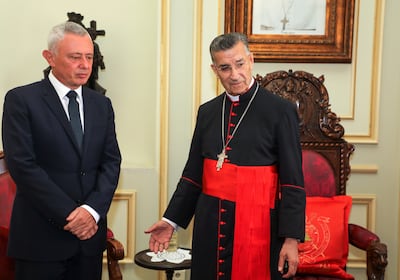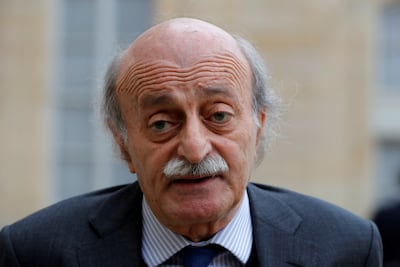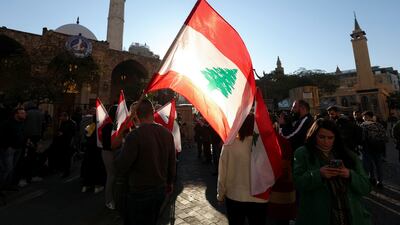Recently, the Lebanese Druze leader Walid Jumblatt, in an interview with Al-Akhbar, said he did not oppose the election of Suleiman Frangieh as Lebanon’s president. This came after a period in which Mr Jumblatt had said precisely the contrary. To many observers, the fact that Al-Akhbar is close to Hezbollah indicated that the Druze leader was sending a message to the party of his potential willingness to endorse its candidate.
Mr Jumblatt is considered a weathervane of Lebanese politics, and his step was carefully calculated. He underlined that his views of Mr Frangieh did not necessarily involve his parliamentary bloc (a useful fiction he often maintains), which is headed, officially at least, by his son Taymour. Therefore, if the bloc was to vote for Mr Frangieh, Mr Jumblatt implied, the candidate would have to make political concessions.
Mr Franjieh’s problem, given that Lebanon’s presidency is reserved for Maronite Christians, is that all the leading Christian parties oppose him. Therefore, the votes of the Jumblatt-led parliamentary bloc would be necessary for him to be elected by a non-Christian majority, along with the votes of some Christian parliamentarians affiliated with Muslim-led blocs. This puts Mr Jumblatt in an enviable position.
Mr Jumblatt’s move was probably motivated by a statement more than two weeks ago by Speaker Nabih Berri, who is a key Hezbollah ally. Mr Berri declared that Mr Frangieh was “the only candidate” for the presidency. The Druze leader always navigates close to Mr Berri and understood that his remark was a reaffirmation that Hezbollah would accept no one else.
It is with great anxiety that the Christians have watched their power wane in Lebanon
Since Mr Jumblatt has no intention of confronting Hezbollah, he saw the political benefit in trying to exploit any consensus around Mr Frangieh. Beyond that, however, why did Mr Jumblatt move at a time when the election of a president still seems to be far off, given the conflict in Gaza and Hezbollah’s decision to support Hamas by opening a Lebanon front? Several things explain the Druze leader’s calculation.
The first is tied specifically to the conflict in Gaza. Many Lebanese, Mr Jumblatt among them, anticipate that once the war along the border with Israel ends, Hezbollah will press to secure the election of a president in whom it has confidence, who will protect the “resistance” the party embodies. From the start, Hezbollah said it sought Mr Frangieh’s election because he would not “stab the resistance in the back”.
Currently, there is rising Israeli and US pressure for a durable agreement along the southern border. Hezbollah wants to ensure there is a president in place who can defend the party’s priorities in any negotiations, or, if the presidential election comes later, in the aftermath of such an agreement. The negotiations would probably involve the US, one of the members of a group of five countries that have formed a contact group on Lebanon, which also includes France, Saudi Arabia, Qatar and Egypt.
Hezbollah may also sense an opportunity here. If there is no presidential election before talks over an understanding on the Lebanese border, which Israel has set as a condition to not invade Lebanon, the party may link Mr Frangieh’s election to any concessions it might make. In other words, if it is asked to withdraw units away from the border, even symbolically, one of the things it may demand in exchange is that the group of five accept Mr Frangieh.
It is increasingly apparent to the group of five that Iran, through Hezbollah, will have a role to play in the presidential election, even though it is not represented in the group. Which is why the Lebanese took notice of a very friendly meeting last week between the Saudi and Iranian ambassadors in Lebanon. In the Gaza conflict, Riyadh has taken a stronger line against Israel, and refused to participate in a coalition of countries the US was trying to form to combat the Houthis.
Iran has welcomed this, and the Saudi-Iranian rapprochement is expected to have a positive impact on the Lebanese scene, perhaps paving the way for eventual Saudi acceptance of Mr Frangieh. This would be important, because if the kingdom comes around, it might be able to persuade its leading Lebanese Christian ally, the Lebanese Forces Party, to vote for Mr Frangieh, lending him communal legitimacy.
The five will reportedly meet in February, though no date has been set. But with some sort of settlement in the Gaza war now part of the equation, there is an opportunity to stabilise Lebanon by ending the presidential vacuum, as a way of stabilising the situation in the Levant.
The lingering question is whether the Lebanese Christian parties would go along. It is with great anxiety that the Christians have watched their power wane in Lebanon, and this can only increase if the most senior Maronite Christian post is decided mainly by non-Christian parties, backed by regional and international powers.
But Christian interests are the last thing on the minds of most countries fed up with Lebanon’s dysfunctional system. The war in Gaza has turned developments in Lebanon into one dimension of addressing the Palestinian-Israeli conflict. How ironic, then, that the five countries might sign off on an arrangement that ultimately strengthens Iran and its allies, who have already benefited greatly from this conflict.
Dengue%20fever%20symptoms
%3Cp%3EHigh%20fever%20(40%C2%B0C%2F104%C2%B0F)%3Cbr%3ESevere%20headache%3Cbr%3EPain%20behind%20the%20eyes%3Cbr%3EMuscle%20and%20joint%20pains%3Cbr%3ENausea%3Cbr%3EVomiting%3Cbr%3ESwollen%20glands%3Cbr%3ERash%26nbsp%3B%3C%2Fp%3E%0A
The stats
Ship name: MSC Bellissima
Ship class: Meraviglia Class
Delivery date: February 27, 2019
Gross tonnage: 171,598 GT
Passenger capacity: 5,686
Crew members: 1,536
Number of cabins: 2,217
Length: 315.3 metres
Maximum speed: 22.7 knots (42kph)
ONCE UPON A TIME IN GAZA
Starring: Nader Abd Alhay, Majd Eid, Ramzi Maqdisi
Directors: Tarzan and Arab Nasser
Rating: 4.5/5
White hydrogen: Naturally occurring hydrogen
Chromite: Hard, metallic mineral containing iron oxide and chromium oxide
Ultramafic rocks: Dark-coloured rocks rich in magnesium or iron with very low silica content
Ophiolite: A section of the earth’s crust, which is oceanic in nature that has since been uplifted and exposed on land
Olivine: A commonly occurring magnesium iron silicate mineral that derives its name for its olive-green yellow-green colour
UAE currency: the story behind the money in your pockets
COMPANY PROFILE
Name: Kumulus Water
Started: 2021
Founders: Iheb Triki and Mohamed Ali Abid
Based: Tunisia
Sector: Water technology
Number of staff: 22
Investment raised: $4 million
GAC GS8 Specs
Engine: 2.0-litre 4cyl turbo
Power: 248hp at 5,200rpm
Torque: 400Nm at 1,750-4,000rpm
Transmission: 8-speed auto
Fuel consumption: 9.1L/100km
On sale: Now
Price: From Dh149,900
Turning%20waste%20into%20fuel
%3Cp%3EAverage%20amount%20of%20biofuel%20produced%20at%20DIC%20factory%20every%20month%3A%20%3Cstrong%3EApproximately%20106%2C000%20litres%3C%2Fstrong%3E%3C%2Fp%3E%0A%3Cp%3EAmount%20of%20biofuel%20produced%20from%201%20litre%20of%20used%20cooking%20oil%3A%20%3Cstrong%3E920ml%20(92%25)%3C%2Fstrong%3E%3C%2Fp%3E%0A%3Cp%3ETime%20required%20for%20one%20full%20cycle%20of%20production%20from%20used%20cooking%20oil%20to%20biofuel%3A%20%3Cstrong%3EOne%20day%3C%2Fstrong%3E%3C%2Fp%3E%0A%3Cp%3EEnergy%20requirements%20for%20one%20cycle%20of%20production%20from%201%2C000%20litres%20of%20used%20cooking%20oil%3A%3Cbr%3E%3Cstrong%3E%E2%96%AA%20Electricity%20-%201.1904%20units%3Cbr%3E%E2%96%AA%20Water-%2031%20litres%3Cbr%3E%E2%96%AA%20Diesel%20%E2%80%93%2026.275%20litres%3C%2Fstrong%3E%3C%2Fp%3E%0A
What can victims do?
Always use only regulated platforms
Stop all transactions and communication on suspicion
Save all evidence (screenshots, chat logs, transaction IDs)
Report to local authorities
Warn others to prevent further harm
Courtesy: Crystal Intelligence
Dengue%20fever%20symptoms
%3Cul%3E%0A%3Cli%3EHigh%20fever%3C%2Fli%3E%0A%3Cli%3EIntense%20pain%20behind%20your%20eyes%3C%2Fli%3E%0A%3Cli%3ESevere%20headache%3C%2Fli%3E%0A%3Cli%3EMuscle%20and%20joint%20pains%3C%2Fli%3E%0A%3Cli%3ENausea%3C%2Fli%3E%0A%3Cli%3EVomiting%3C%2Fli%3E%0A%3Cli%3ESwollen%20glands%3C%2Fli%3E%0A%3Cli%3ERash%3C%2Fli%3E%0A%3C%2Ful%3E%0A%3Cp%3EIf%20symptoms%20occur%2C%20they%20usually%20last%20for%20two-seven%20days%3C%2Fp%3E%0A
The specs: 2018 Jaguar F-Type Convertible
Price, base / as tested: Dh283,080 / Dh318,465
Engine: 2.0-litre inline four-cylinder
Transmission: Eight-speed automatic
Power: 295hp @ 5,500rpm
Torque: 400Nm @ 1,500rpm
Fuel economy, combined: 7.2L / 100km
Nayanthara: Beyond The Fairy Tale
Starring: Nayanthara, Vignesh Shivan, Radhika Sarathkumar, Nagarjuna Akkineni
Director: Amith Krishnan
Rating: 3.5/5
The burning issue
The internal combustion engine is facing a watershed moment – major manufacturer Volvo is to stop producing petroleum-powered vehicles by 2021 and countries in Europe, including the UK, have vowed to ban their sale before 2040. The National takes a look at the story of one of the most successful technologies of the last 100 years and how it has impacted life in the UAE.
Read part four: an affection for classic cars lives on
Read part three: the age of the electric vehicle begins
Read part one: how cars came to the UAE
Day 3, Abu Dhabi Test: At a glance
Moment of the day Just three balls remained in an exhausting day for Sri Lanka’s bowlers when they were afforded some belated cheer. Nuwan Pradeep, unrewarded in 15 overs to that point, let slip a seemingly innocuous delivery down the legside. Babar Azam feathered it behind, and Niroshan Dickwella dived to make a fine catch.
Stat of the day - 2.56 Shan Masood and Sami Aslam are the 16th opening partnership Pakistan have had in Tests in the past five years. That turnover at the top of the order – a new pair every 2.56 Test matches on average – is by far the fastest rate among the leading Test sides. Masood and Aslam put on 114 in their first alliance in Abu Dhabi.
The verdict Even by the normal standards of Test cricket in the UAE, this has been slow going. Pakistan’s run-rate of 2.38 per over is the lowest they have managed in a Test match in this country. With just 14 wickets having fallen in three days so far, it is difficult to see 26 dropping to bring about a result over the next two.
The%C2%A0specs%20
%3Cp%3E%0D%3Cstrong%3EEngine%3A%20%3C%2Fstrong%3E6-cylinder%2C%204.8-litre%20%0D%3Cbr%3E%3Cstrong%3ETransmission%3A%20%3C%2Fstrong%3E5-speed%20automatic%20and%20manual%0D%3Cbr%3E%3Cstrong%3EPower%3A%20%3C%2Fstrong%3E280%20brake%20horsepower%20%0D%3Cbr%3E%3Cstrong%3ETorque%3A%20%3C%2Fstrong%3E451Nm%20%0D%3Cbr%3E%3Cstrong%3EPrice%3A%20%3C%2Fstrong%3Efrom%20Dh153%2C00%0D%3Cbr%3E%3Cstrong%3EOn%20sale%3A%20%3C%2Fstrong%3Enow%3C%2Fp%3E%0A
if you go
The flights
Air Astana flies direct from Dubai to Almaty from Dh2,440 per person return, and to Astana (via Almaty) from Dh2,930 return, both including taxes.
The hotels
Rooms at the Ritz-Carlton Almaty cost from Dh1,944 per night including taxes; and in Astana the new Ritz-Carlton Astana (www.marriott) costs from Dh1,325; alternatively, the new St Regis Astana costs from Dh1,458 per night including taxes.
When to visit
March-May and September-November
Visas
Citizens of many countries, including the UAE do not need a visa to enter Kazakhstan for up to 30 days. Contact the nearest Kazakhstan embassy or consulate.
Super%20Mario%20Bros%20Wonder
%3Cp%3E%3Cstrong%3EDeveloper%3A%20%3C%2Fstrong%3ENintendo%20EPD%3Cbr%3E%3Cstrong%3EPublisher%3A%20%3C%2Fstrong%3ENintendo%3Cbr%3E%3Cstrong%3EConsole%3A%20%3C%2Fstrong%3ENintendo%20Switch%3Cbr%3E%3Cstrong%3ERating%3A%20%3C%2Fstrong%3E4%2F5%3C%2Fp%3E%0A
Yahya Al Ghassani's bio
Date of birth: April 18, 1998
Playing position: Winger
Clubs: 2015-2017 – Al Ahli Dubai; March-June 2018 – Paris FC; August – Al Wahda
West Asia Premiership
Dubai Hurricanes 58-10 Dubai Knights Eagles
Dubai Tigers 5-39 Bahrain
Jebel Ali Dragons 16-56 Abu Dhabi Harlequins
AI traffic lights to ease congestion at seven points to Sheikh Zayed bin Sultan Street
The seven points are:
Shakhbout bin Sultan Street
Dhafeer Street
Hadbat Al Ghubainah Street (outbound)
Salama bint Butti Street
Al Dhafra Street
Rabdan Street
Umm Yifina Street exit (inbound)





